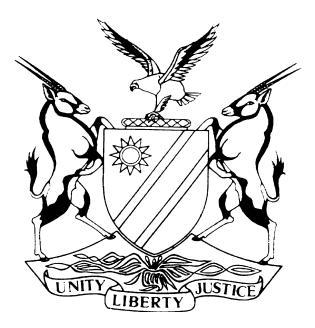5
REPUBLIC OF NAMIBIA

HIGH COURT OF NAMIBIA MAIN DIVISION, WINDHOEK
Practice Directive 61
Case Title: STANDARD BANK NAMIBIA LIMITED PLAINTIFF and PAULUS PENDUKENI NTINDA 1ST DEFENDANT AINA TWEUTHIGULA SHIKODHI NTINDA 2ND DEFENDANT | Case No: HC-MD-CIV-ACT-CON-2021/04862 | |
Division of Court: HIGH COURT(MAIN DIVISION) | ||
Heard before: HONOURABLE JUSTICE COLEMAN, JUDGE | Date of Hearing: 18 May 2022 | |
Date of Order: 8 June 2022 | ||
Neutral citation: Standard Bank Namibia Limited v Ntinda (HC-MD-CIV-ACT-CON-2021/04862) [2022] NAHCMD 283 (8 June 2022) | ||
Results on merits: Merits not considered. | ||
The order:
| ||
Reasons for orders: | ||
COLEMAN J: Introduction [1] This is an application for summary judgment against the second defendant. First defendant did not oppose the matter and I granted default judgment against him in terms of prayers 1 to 5 of the particulars of claim on 18 May 2022. Plaintiff’s case [2] Plaintiff’s case is that on 8 February 2017 first defendant entered into a written instalment sale agreement in respect of a Toyota Hilux vehicle with plaintiff. First defendant breached the agreement by defaulting on payments. [3] According to plaintiff, first and second defendants are married in community of property. Plaintiff annexes as annexure “A” to its particulars of claim a Marital Status Declaration signed by first defendant which states his marital status as ‘Married in Community’. Annexure “B” to the particulars of claim is a ‘Marriage in Community of Property Spouse’s Consent”’ signed by second defendant on 8 February 2017 in which she consents to first defendant entering into the agreement in respect of the Toyota vehicle. [4] Plaintiff asks for its relief against both defendants by virtue of the marriage in community of property. Second defendant’s case [5] Second defendant gave notice of intention to defend the matter and also resists the summary judgment application. In essence her defence is that she is not married in community of property with first defendant. She asserts she erroneously consented to the agreement between plaintiff and first defendant. [6] She relies on the provisions of section 17(6) of the Native Administration Proclamation 15 of 1928 (the Proclamation), since the marriage took place in the north of Namibia, and asserts that she and first defendant made the declaration required to render their marriage in community of property on the day of their marriage, 24 August 2013. Her contention is that the one month period referred to in section 17(6) of the Proclamation was not complied with. Conclusion [7] In my mind the core issue in determining the defendants’ marriage regime is whether, the fact that they made the declaration to be married in community of property at the time of their marriage was solemnized, should be ignored in light of the provisions of section 17(6) of the Proclamation. It turns on the interpretation of the phrase ‘…at any time within one month previous to the celebration of such marriage…’ [8] I have been referred to the matter of Hamupolo v Simon N.O. (HC-MD-CIV-MOT-GEN-2020/00078) NAHCMD (08 February 2022) where the learned judge held that the declaration must be made one month before the marriage is solemnized. If not the marriage is out of community of property, On the other hand, I was referred to the matter of Shambwila Moses v Tulimeke Shjambwila (I 182/2014) [2016] NAHCNLD 91 (17 November 2016) where the declaration (which disappeared) was signed on the day of the marriage. In this matter it was held that the marriage was in community of property. [9] Ultimately, it depends on the proper interpretation of the phrase referred to in para 6 above. In my view the proper interpretation of ‘any time within one month previous to the marriage’ means that the declaration must be made no longer than a month before the marriage. According to Macmillan online dictionary1 the use of ‘within a month’ connotes ‘inside the period of time’ of a month. Therefore, section 17(6) of the Proclamation contemplates that the declaration must be made inside the month before the marriage. Consequently, in my view it can be made on the same day as the marriage. [10] A number of cases I read in this context show that the couple is generally only informed of the choice between in or out of community of property at the time of marriage. To interpret the Proclamation that the declaration must be made at least a month before the marriage can potentially visit unintended choices on couples. Furthermore, there is no rhyme or reason why it should be done a month before the marriage and if not the choice is invalid. In any event, this is an offensive stipulation which treats so-called ‘natives’ who get married in the north of Namibia different from the rest. Therefore, it should be approached in a way that does not allow the erosion of choice of marital regime or as a tool to prejudice third parties. [11] In any event the defendants unequivocally held themselves out to be married in community of property to the plaintiff. It was clearly not a bona fide mistake. Second defendant asserts under oath that they made the declaration to be married in community of property – albeit according to her, late - and they clearly held themselves out to be so married. [12] As far as the judgment against second defendant is concerned, plaintiff asks for specific relief against first defendant in prayer 2 of the particulars of claim. In my view granting an order against second defendant for the same prayer would not in any way be onerous. [13] Therefore, I make the following order:
| ||
Judge’s signature | Note to the parties: | |
Coleman Judge | Not applicable. | |
Counsel: | ||
Plaintiff | Second defendant | |
Mr Tjiteere Of Dr Weder, Kauta & Hoveka Inc. | Mr Ikanga Of Ikanga Legal Practitioners | |
1 Macmillandictionary.com